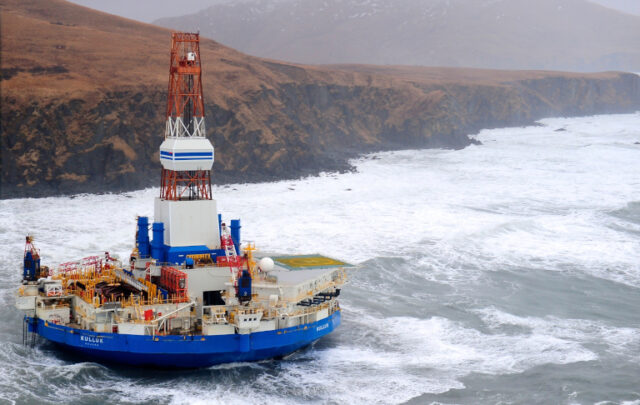Click on the headline (link) for the full text.
Europe facing peak oil [report]
Benoît Thévard, Yves Cochet, The Greens| EFA in the European Parliament
Abstract
Plentiful and cheap oil has enabled Europe to become one of the world’s wealthiest modern economies. But today, this has also become Europe’s main weak point. Sectors essential to people’s way of life have become completely dependent on this non-renewable resource. Millions of Europeans work in industries to manufacture aircraft, cars, plastics and all kinds of appliances that only exist thanks to oil.
Millions more nourish themselves on fruits, vegetables and other agricultural products which are grown with fertilisers and biocides derived from the petrochemical industry, and which are transported mainly by road. Millions of people require medicines whose composition includes petrochemical products, go to work every day by car, or warm their homes with heating-oil boilers. Soon the European Union will be importing its entire requirement of this form of energy and, unless it radically reorganises and converts many sectors of its economy, it will be completely subjected to the new constraints that govern the global energy market since the beginning of the century.
We have in fact reached “peak oil” – the maximum level of global oil production that geophysicist Marion King Hubbert modelled in the late 1950s. In the latest issues of World Energy Outlook, the International Energy Agency recognises that the production of conventional crude oil levelled out towards 2006 and has begun to decline. This means trouble, given that the decline will happen at a quicker pace than the development of non-conventional hydrocarbons. Until recently, the two key factors determining production capacity were the price of crude oil and the level of consumption. Today, other constraints have become too strong and too numerous to be ignored. The massive investments required, extreme operating conditions, an increasingly low Energy Return on Energy Invested (ERoEI), significant environmental risks and impacts, and serious geopolitical instabilities are a number of limiting factors that might well preclude the higher production levels forecast by many public and private organisations.
Evaluations of global oil reserves are inevitably inaccurate owing to the large number of operators involved, the confidentiality of certain data, the complexity of the evaluation methods used, and the vagueness of international definitions. With so many variables, it is easy for oil-producing countries and private oil companies alike to juggle the figures and paint a conveniently vague and misleading picture of the situation in order to further their own aims. It is also possible to give the impression that new oil fields are being discovered every day, when in actual fact the rate of discovery has been falling steadily for over forty years. Since the 1980s, the world has been consuming more oil than it discovers, which means that the oil industry has been using up its stocks. The recent increase in global reserves has been achieved by including long-known reserves of extra-heavy oils from Canada (tar sands) and Venezuela in the estimates. More than 330 billion barrels have thus been added to proven reserves since 1999, although these are not new discoveries and despite the fact that, technically speaking, this type of hydrocarbons cannot be classified as conventional crude oil. Moreover, almost all of the new discoveries that have been made in recent times are located in deep-sea regions requiring very high production and investment costs and entailing much more serious environmental risks.
Everywhere in the world, the best oil fields have been fully exploited, with the exception of Iraq, where the development of the oil industry is hindered by political instability. With a margin of accuracy of approximately 20%, we can say that remaining oil reserves (2P) can be estimated at 1,000 Gb, to which 500 Gb of extra-heavy oil may be added.
Industrial societies are today confronted with the challenge of production capacity – a key factor which in the past made it possible to regulate the price of oil. Historically, global production capacity was managed by the United States up until 1971, when U.S. oil producers had to face the facts: the country was no longer able to increase national production, which had now passed its peak. The OPEC countries took over the task of managing production capacity, which included holding meetings to fix the selling price of oil. However, full international awareness of the vulnerability of oil-importing countries only came with the first two oil shocks (in 1973 and 1979), which can be described as “supply-side shocks”.
It was at this time that the International Energy Agency was set up and strategic stocks were created in OECD countries. From 2004 to the 2008 oil shock, global production remained surprisingly stable, in spite of a threefold increase in the price of oil. This shows two things: In the first place, the current oil shock is not associated with a fall in production, unlike the two previous shocks; and, secondly, oil producers have been unable to increase production to halt the upward spiral of prices. The current shock can therefore be described as a “demand-side shock”
(March 2013)
International oil companies’ oil production peaked in 2004 and declined by 2.1 % pa
Matt Mushalik, Crude Oil Peak
Oil production (crude and NGLs) of 5 international oil companies has been declining by a total of 15% over the period 2004-2011.
Merci, Jean (Lahererre, ASPO France) pour m’avoir envoyé quelques graphes sur le déclin du production des compagnies pétrolières internationales. Ça m’a donné l’ideee de faire d’autres graphes plus détaillés.

We stack the above curves and find a decline rate of 2.1 % between a peak in 2004 and 2011.

The peak in 2004 was created by BP acquiring 50% of the Russian oil assets of Tymen Oil Company (TNK), Onako and Sidanco in 2003. This asset is being sold again, to pay for damages of the Deepwater Horizon oil spill…
Full article here contains many graphs and charts
(11 March 2013)
UK more vulnerable from disruption to oil supplies
Roland Gribben, The Daily Telegraph
The extensive rationalisation, coupled with the rundown in storage depots and refineries has reduced the amount of petrol and diesel stocks at filling stations by the equivalent of two days demand.
It also means the average time it takes a motorist to get from home to the nearest petrol pump has doubled from five to 10 minutes.
Currently, stock levels are enough to meet six to eight days demand but, with some operators running below capacity to save money, total storage capacity could be lower, according to data produced by business advisers Deloitte for the Department of Energy and Climate Change (DECC)…
(10 March 2013)
Greenland government falls as voters send warning to mining companies
Terry Macalister, The Guardian
The race for resources in the frozen wastes of the Arctic has brought down its first national government, leaving foreign oil and mining companies shivering about the future. Voters in Greenland feared that ministers were surrendering their country’s interests to China and foreign multinationals and called an end this week to the government of prime minister Kuupik Kleist.
London Mining, which has a former British foreign minister, Sir Nicholas Bonsor, on the board, has been at the centre of a row in the country after speculation it could bring in 2,000 Chinese workers to build one of the world’s biggest iron ore mines expressly to serve steel mills in Beijing.
The activities of Edinburgh-based Cairn Energy, which drilled for oil off Greenland’s south-west coast in 2011, had also polarised opinion between those who welcomed the potential for a hydrocarbon strike bringing huge economic wealth and those worried about spills.
The Siumut party in Greenland, led by Aleqa Hammond, has just won 42% of the vote, allowing it to form a coalition government in place of the current ruling party led by Kleist…
(15 March 2013)
Offshore oil rig at sunset – arbyreed/flickr






